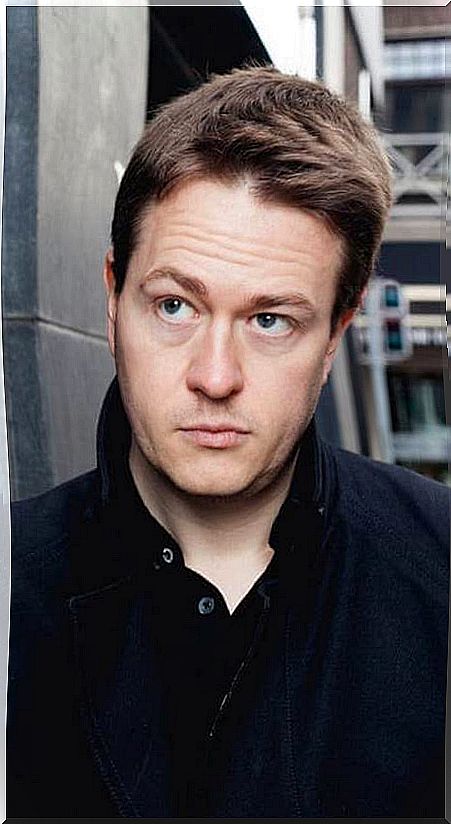“Your Depression Is Not A Technical Problem, It Is A Sign. Listen To It.”
The writer and journalist Johann Hari, after suffering a long depression, decided to study the root causes of this alteration. He found that most of the factors that have been shown to cause depression and anxiety are not in our biology.

The writer and journalist Johann Hari suffered from depression as a child and began taking antidepressants as a teenager. The doctor told him that the cause of his deep sadness was a chemical imbalance in his brain that could be treated with drugs. “Then he gave me an antidepressant and I felt a lot better for a while, I got a genuine boost. But then the depression came back. So they gave me higher and higher doses. For 13 years I took the maximum dose possible. However, I still felt. a lot of anguish. I started to ask myself: ‘If I’m doing everything they tell me to do, why do I still feel like this?’ “Hari tells us.
In search of answers to this question, Hari ended up making a 40,000-mile journey.
He interviewed leading scientific experts and people who have suffered from depression in all parts of the world and collected the results of his research in a book, Lost Connections (Ed. Captain Swing), which has already become an international best seller . In it the writer discovers that there is scientific evidence of nine factors that lead to depression. And most importantly, according to Johann Hari, “that most of the factors that have been shown to cause depression and anxiety are not in our biology.”
– You can give us an example … –
For example, if you are really alone, you are much more likely to get depressed. If you are controlled at work, you are much more likely to become depressed. If you don’t interact with the natural world, you are much more likely to get depressed. These are factors that have to do with the way we live, and once we understand them, a very different set of solutions opens up that should be offered alongside the choice of medications.
We all know that we have natural physical needs. Obviously, we need food, we need shelter, we need water, we need clean air … If I take those things away from you, you would be in trouble. Very fast. But there is equally strong evidence that all human beings have natural psychological needs. We need to feel that we belong. We need to feel that our life has meaning and purpose.
This culture we have built is good at many things, but we are becoming less and less good at meeting people’s deep underlying psychological needs.
– That’s why the drugs were not enough to treat his depression.
–The truth about chemical antidepressants is quite simple. We know this from leading experts in places like Harvard and Yale, and from the research they have done. The truth is that chemical antidepressants provide relief for some people, which is of great value, but sadly, the best long-term research – called the Star-D trial – shows that most people who take them get depressed. again in time. On their own, for most people, they are not enough to solve the problem. People can see this around them.
For thirty years we have been prescribing more and more antidepressants, and each year depression and anxiety have continued to increase.
– And do you think that attending to psychological needs would stop this trend?
This different way of thinking only started to fit in for me the day I went to see an amazing South African psychiatrist named Dr. Derek Summerfield. I was in Cambodia in 2001 when chemical antidepressants were first introduced for people in that country. The local doctors, the Cambodians, had never heard of these drugs and asked what they were. Dr. Summerfield explained it to them and they said they didn’t need them, they already had antidepressants. What did they mean? The doctor thought they were going to talk to him about some natural remedy. Instead, they told him a story.
– What did they explain to you that was so momentous?
–There was a farmer in your community who worked in the rice fields and one day he stood at a land mine and had his leg blown off. Then they gave him an artificial leg and, after a while, he went back to working in the fields. But working underwater is painful when you have an artificial leg. The farmer started crying all day, refused to get out of bed … He developed a classic depression.
That’s when Cambodian doctors gave him their version of an antidepressant. What was it? They sat down with him. They heard it. They realized that their pain made sense: it had a cause. One of them said: if we bought him a cow he could stop working in the rice fields and become a dairy farmer, then he would not be in this position which is ruining him so much. They decided to buy the cow from him. Within a few weeks, her crying stopped. Within a month his depression had disappeared.
They told Dr. Summerfield that that cow was an antidepressant.
– What reading can we get from this story?
-If you were raised to think about depression like me, if they told you that it is only a problem in your brain, the story may seem like a joke in bad taste: “I went to my doctor for an antidepressant and she gave me a cow “. But what those Cambodian doctors intuitively knew from this anecdote is what the world’s leading medical body, the World Health Organization, has been trying to tell us for years based on the best research: “If you are depressed, if you are anxious “You are not weak. You are not crazy. In general, you are not a machine with broken parts. You are a human being with unmet needs.”
Look what those Cambodian doctors didn’t say. They didn’t say, “You have to recover.” They said otherwise: “We are here to help you deal with the causes of depression in your life.” It is what every depressed person deserves. That is why the United Nations’ leading physician has told us that we must focus less on chemical imbalances and more on solving imbalances in the way we live. While medicine can give some people some relief, we need a lot more.
Precisely because this problem runs much deeper than our biology, the solutions must also run much deeper.
I could only begin to change my life when I learned: “Your depression is not a technical problem. It is a sign. Your suffering makes sense. You feel this for reasons, and those reasons can be treated.” It took me a long time to realize this but the message from scientists is becoming increasingly clear: we need to stop insulting these signals and start listening to them because they are telling us something we really need to hear. Only when we begin to hear this pain will we be able to see the deepest solutions, the cows, that await us around us.
– Did you manage to understand the meaning of your pain?
-I had a fairly severe depression for a long time, from my adolescence. In my case, I had experienced quite severe abuse from an adult as a child. I never wanted to think about this or talk about it. But, in the process of writing this book, I interviewed top experts who have shown how childhood trauma can cause depression (and all kinds of other adult problems, like obesity and addiction) and they taught me something really important that they had found in his research: it is not the abuse that destroys you but the shame of the abuse.
If you can find safe places to release the shame you are feeling, that can free you from your depression. People who experience child abuse often internalize the voice of their abuser – they think they don’t deserve to be treated with love and care. A safe and loving connection that helps you release your shame allows you to release those abusive voices from your mind. Evidence shows that reducing shame profoundly heals and reduces depression and anxiety. This data is surprisingly encouraging.
–Sometimes the cause of depression can be much less obvious, such as having a job that we don’t like…
–There is strong evidence that human beings need to feel that our lives have meaning, that we are doing something with a purpose that makes a difference. It is a natural psychological need. But between 2011 and 2012, the Gallup polling company conducted the most detailed study ever conducted of how people feel about what we spend most of our lives doing: our paid work. They found that 13 percent of people say they are “engaged” in their work; They find it meaningful and look forward to it. About 63 percent say they are “not engaged,” which is defined as “sleepwalking during their workday.” And 24 percent of people are “actively offline” – they hate their job.
I found that the majority of depressed and anxious people I know are in the 87 percent who don’t like their jobs. So I started researching to see if there is any evidence if this could be related to depression. It turned out that in the 1970s an Australian scientist named Michael Marmott had made a breakthrough in trying to answer this question: Who is most likely to have a stress-related heart attack the big boss at the top of a company or someone below? of the?
They all told him, “You’re wasting your time. Obviously, the boss will be more stressed because he has more responsibility.” But when Michael published his results, he revealed that the truth was exactly the opposite: the lower an employee is in the hierarchy, the higher their stress levels and their likelihood of having a heart attack. Now I wanted to know why. And the answer is that humans have an innate need to feel that what we are doing, day by day, is meaningful. When you are controlled you cannot create meaning from your work.
Suddenly, the depression of many of my friends, even those who had sophisticated jobs, who spend most of their waking hours feeling controlled and unappreciated, began to seem not like a problem related to their brains, but a problem. with its surroundings. I learned that there are many causes of depression like this.
“He says loneliness is another of these causes …
One of my heroes is a doctor named Sam Everington.” He is a general practitioner in a poor part of East London. At one point he realized that he was really uncomfortable. He had a lot of patients who came to him with depression, and although he was not opposed to chemical antidepressants, he found that they were not solving many of them. Then one day, he decided to try something different.
A woman named Lisa Cunningham, who I later met, came to his office. Lisa had been locked in her home with crippling depression and anxiety for seven years. He had barely left his house. Sam said, “Don’t worry, I’ll keep giving you these drugs. But I’m also going to prescribe something else.”
There was a scrubby field behind the doctors’ offices. Sam told Lisa, “I suggest you come a few times a week and meet with a group of other depressed people to find something meaningful to do together.”
The first time the group met, Lisa was literally physically ill. But the group began to speak. They asked him: “What can we do?” They decided that they were going to build a garden. These were people from central London (like me) and they knew nothing about gardening. So they started reading books, watching videos. They began to put their fingers in the ground. They began to learn the rhythms of the seasons. There is a lot of scientific evidence that exposure to the natural world is a really powerful antidepressant.
But they began to do something even more important: they began to form a tribe. They began to form a group. They began to worry about each other. If one of them didn’t show up, I’d go looking for them.
When I met Lisa she told me: “When the garden began to bloom, we began to bloom.” This approach is called social prescribing, and more and more studies show that it produces substantial decreases in depression and anxiety. And this was something that I saw all over the world where I researched this, from San Francisco to Sydney to Sao Paulo – the most effective strategies for dealing with depression and anxiety are the ones that address the reasons why we feel this way.
“Should we go back to living in a tribe?”
“I spent a lot of time talking to a man named Professor John Cacioppo in Chicago, who was the world’s leading expert in solitude. He asked me: “Why do all of us in this room exist?” One reason is that our ancestors in the savannas of Africa were really good at one thing than we are. They weren’t bigger than the animals they shot down; they weren’t faster than the animals they shot down; but they were much better at joining in groups and cooperating.
Just as bees evolved to live in a hive, humans evolved to live in a tribe.
We are the first humans to try to dissolve our tribes. We are the loneliest society in human history. A recent study asked Americans, “How many people know you well?” Half of them said: nobody. This data is not so bad in Spain, but it is getting worse.
–So, how does living in an increasingly individualized society influence us?
One of the ways I came to understand this was when I interviewed an interesting person named Dr. Brett Ford. He did a really simple but interesting study. And what he discovered was something that at first seems really strange: In general, in the United States, if you consciously try to make yourself happier, you can’t be happier. However, in other countries if you try to make yourself happier, you do it.
Why was this happening? What they found is that in the United States, in general, if you try to be happier, you do something for yourself: you buy something, you work harder for a promotion, you treat yourself, whatever it is. In other countries, in general, if you try to make yourself happier, you do something for another person, your friends, your family or your community.
I realized that for a long time my story about happiness had been wrong. When I felt distress, I faced it through some individual achievement: buying something for myself, doing something “awesome” at work, achieving some external success. And it rarely worked. It rarely made me happier. Now when I feel those feelings coming (sometimes I do), I try to do something for someone else. It can be as simple as leaving my phone at home, visiting someone who needs me, and listening carefully.
In a society where people are so lonely, being heard is an incredible gift.
And this simple change, of realizing that my happiness can only come from increasing the happiness of others, has had a strong effect on me. It is one of the many changes I made in my own life that I describe in the book.
As a culture, we have become deeply individualistic. It has trained us to seek happiness in all the wrong places.
– Do you think we are experiencing a crisis of values? How does that predispose us to depression?
“For thousands of years philosophers have said,” If you think life is about money, status , showing off … you will feel like shit. That is not an exact quote from Confucius, but that is the essence of it. he said.But strangely, no one had scientifically proven this until an amazing man I knew, Professor Tim Kasser, did.
Your research suggests crucial ideas. The more you think that life is about buying things and showing them off to other people, the more likely you are to become depressed and anxious, and as a society we are driven more by these forces.
At first this seems pretty obvious. Everyone who is reading this knows that they will not lie on their deathbed and think about all the “likes” they got on Instagram and all the shoes they bought. They will think of moments of love and connection. But, as Professor Kasser told me, we live in a machine designed to make us neglect what is important in life. We are constantly bombarded with messages telling us to seek happiness in all the wrong places.
– You affirm that the disconnection of a hopeful or secure future also leads us to depression. Could things like climate change or political instability harm our emotional health?
– This goes to a very important point. There are things that should make us anxious and deeply unhappy. As a species, we are currently destroying the life systems of the planet. It is okay to be anxious. We should be anxious. Only a very strange person wouldn’t be anxious about it. Of course, we don’t want to be paralyzed by that anxiety.
We need to use that anxiety to propel us to fight for change.
– His profession, journalism, allowed him to investigate the real causes of depression. The information he found was so relevant that it changed his life. Do you think that one day it will be possible for the general public to access this information?
-Absolutely. I think somehow people already feel that the explanation given to us for our growing epidemics of depression and anxiety is too simplistic. Most people, when asked: ‘Does loneliness cause depression? Does being financially insecure cause depression? Does being abused as a child cause depression? Does being controlled and humiliated at work cause depression? ‘, Of course, they answer yes.
But when they go to the doctor, too often, they are told a very simplistic story: that these deep feelings are just the result of something wrong with their brains, and all they need to do is take drugs. To see the deeper solutions to depression and anxiety, we must think differently about what our depression really is. There are very real biological contributions to depression and anxiety. But if we allow biology to become the whole picture, as we have done for so long, myself included, that implicitly tells people, “your pain means nothing.” Biology is real, but it is part of a bigger picture.
To know more…
Lost connections. Real causes and unexpected solutions for depression is a book that has been published in Spain by the editorial Captain Swing. The writing leads us to a different debate than usual about depression and anxiety.
TO BUY









